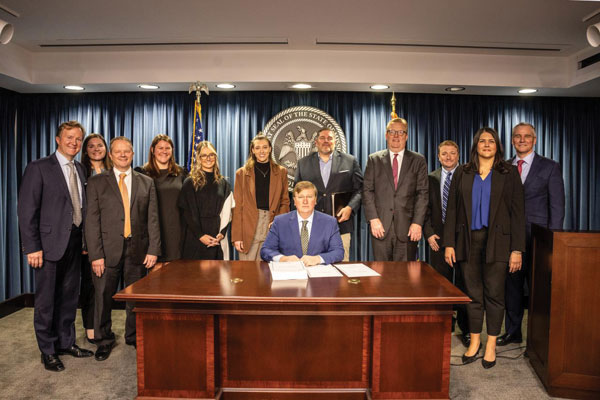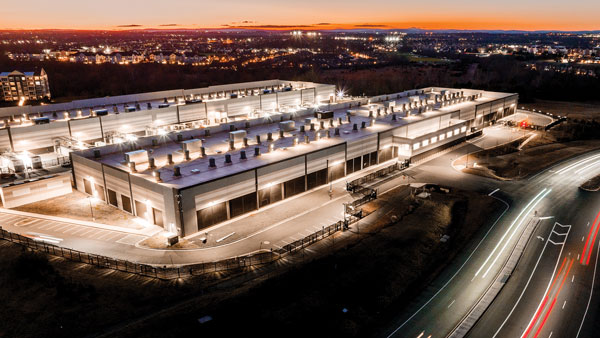When Amazon Web Services broke ground May 20 on what will become a $10 billion data center complex in Madison County near the state capital of Jackson, the $1.3 trillion company did more than launch a transformational project in the heart of Mississippi.
It validated the patient seed-sowing strategy of state and local leaders who had the foresight last decade to change the way they do business.
To understand why the world’s largest AI company is expanding its hyperscaling computing model in the heart of Mississippi, you have to take a trip back in time to a table at a restaurant in an historic hotel in Central Mississippi about seven years ago.
“We really did not have anything moving the needle,” recalls Haley Fisackerly, the president and CEO of Entergy Mississippi, the state’s largest electric utility. “There was a need for a larger electric grid without putting the burden on our existing customers. We needed to find something that moved the needle.”
That’s when Gray Swoope, former director of Mississippi Development Authority and now founder and president of VisionFirst Advisors in Tallahassee, Florida, joined Fisackerly and an AWS executive for an informal conversation at the historic Fairview Inn in Jackson.
“Gray said we should start looking at data centers,” says Fisackerly. “We sat under an oak tree at the Fairview Inn and started writing down ideas on a napkin. If we did what we needed to do to attract the right kind of data centers, it would give us the volume we needed to support business.”
As Swoope would later recount, “It started with exploring the world of the possible.”
That one conversation set in motion a series of events that would ultimately lead up to Amazon’s announcement in late January 2024 to develop two data center campuses totaling 1GW at a state mega-site of over 1,000 acres in Madison County.
That site was the beneficiary of a 7-year-long state effort to secure and prepare new industrial sites under the Site Development Grant Program which enables the state to provide the kinds of shovel-ready sites investors are seeking.
Fisackerly recounts that the Fairview Inn meeting was pivotal because it showed us “that there were about five to six things that we needed to do in Mississippi if we were going to land one of these giant data center deals. After that meeting, we began to make various changes on how we make Mississippi more attractive and get more funding for both site development and workforce development.”
A ‘Transformational’ Win for Mississippi
The hard work paid off. “Last spring [2023], we got a call,” says Fisackerly. “It was from Amazon. They said, ‘Can you help us deliver two major hyperscale data centers by the spring of 2027?’ After picking myself up off the floor, we went to work with the governor, the Mississippi Development Authority and the Madison County Economic Development Authority. They had gone into developing a very attractive site in northern Madison County. They identified other sites near transmission lines too. We had to work with the Legislature and the Governor’s Office on the legislation to expedite the process. That led to the passage of legislation and approval of AWS in January.”
Today, Fisackerly calls the Amazon project “transformational and generational.”
 Gov. Tate Reeves signs legislation authorizing Project Atlas — the deal to bring $10 billion in AWS data centers to Madison County, Mississippi.
Gov. Tate Reeves signs legislation authorizing Project Atlas — the deal to bring $10 billion in AWS data centers to Madison County, Mississippi.
Photo courtesy of MDA
The project brings with it 1,000 high-wage, high-tech jobs for Mississippi residents. “It’s hard to put into words just how important today is to the future of Mississippi,” Gov. Tate Reeves said at the groundbreaking. “It’s truly a watershed moment in Mississippi economic development history, and I’m proud of the massive impact the project will have on our state. In recent years, we’ve seen multiple record-breaking private sector investments, we’ve reached historic new heights when it comes to education, and we’ve worked hard to train our workforce for the jobs of the next 50 years. This record-shattering investment from Amazon Web Services will continue to ignite further economic growth and drive our state forward. The future of Mississippi is bright, and the only day better than today is tomorrow.”
This is not the first time Amazon has made a sizable investment in Mississippi. Since 2010, Amazon has invested $2.3 billion in the state to build five fulfillment and sortation centers, four delivery stations, five solar farms, a wind farm and a Whole Foods Market location. During that time, Amazon has hired over 7,500 workers in the state.
“We choose locations based on electricity availability; access to renewable power; redundant power; stability of the grid; proximity to an existing cluster of similar projects; and a welcoming community.”
– Roger Wehner, Economic Development Director, AWS
“Since 2011, AWS has invested more than $108 billion in its infrastructure across the U.S. to support customers of all kinds, and across all industries, in their digital transformation,” said Roger Wehner, AWS director of economic development. “Building on this, we are excited to expand our operations into Mississippi through this planned $10 billion investment, which will tap into the burgeoning tech sector across the state to create new, well-paying jobs and boost the state’s gross domestic product each year. We look forward to delivering new workforce development opportunities and educational programs that support the next generation of talent across the Magnolia State.”
Many Factors Sealed the Deal
In a previous interview with Site Selection magazine, Wehner outlined his top criteria when scouring the countrywide for new AWS data center sites: “Our site selection methodology is quite complex and rigorous,” he said. “We choose locations based on electricity availability; access to renewable power; redundant power; stability of the grid; proximity to an existing cluster of similar projects; and a welcoming community.”
In a more recent email exchange with Wehner about the Madison County deal, he added that “where we locate our infrastructure is based on a combination of factors. We consider locations in terms of our ability to give customers low latency when running applications, the availability of renewable energy, and the local government’s and community’s long-term commitment to investing in technology infrastructure. The two sites selected in Madison County afford us compelling site solutions.”
When asked what Amazon liked best about the available workforce in Madison County, Wehner said, “This project is estimated to create at least 1,000 high-paying, high-tech jobs. We will work with the community to hire and train people to fill these jobs. When deciding to locate in the Greater Jackson area, we knew that the region had a strong, skilled technical workforce, and we wanted to not only tap into that workforce but work hand-in-hand with local partners to continue upskilling people throughout the region. We are building a first-of-its-kind training center to support careers in cloud computing and the skilled technical workforce required to connect, operate and maintain our cloud computing infrastructure with AWS and our network of contractors, vendors and partners. For example, we will offer multiple workforce development workshops and programs, including free fiber-optic splicing courses, and collaborations with Hinds and Holmes Community Colleges to support fiber-optic technician certification courses.”
AWS Found a ‘Willing Partner’
Wehner has previously noted that, when conducting a location search like this one, it’s imperative to find a willing partner. “We will ask you regularly to review your bureaucratic inefficiencies; and speed to market is actually more important to us than costs,” he said, adding that AWS also expects its hosts to maintain confidentiality, “make it easy to say yes,” and plan and build for a skilled technical workforce at scale.
 AWS is committing to invest in 650MW of new renewable energy capacity in Mississippi to power its data centers in Madison County. Most AWS facilities, like the one shown here in another location, run on alternative power.
AWS is committing to invest in 650MW of new renewable energy capacity in Mississippi to power its data centers in Madison County. Most AWS facilities, like the one shown here in another location, run on alternative power.
Photo courtesy of AWS
Wehner has also noted that Amazon seeks “appropriate CAPEX treatment and a stable political environment” — two factors the company found in its Mississippi host.
The final piece of the puzzle was the state legislative package paving the way for the deal — code-named Project Atlas — to be signed. In late January, the state approved a $44 million incentives package for the project, with $32 million going toward worker training. The incentives package includes a 10-year, 100% corporate income tax exemption, along with sales and use tax exemptions for construction and any investments made for up to one year after construction.
A rolling 30-year tax exemption will be granted to Amazon as long as the company invests at least $500 million annually and hires at least 50 new workers each year. Amazon will start paying income taxes after 10 years.
Lawmakers also authorized Madison County to borrow $215 million from the state to cover the costs of road improvements and water and sewer system extensions. Legislative leaders said Amazon will replay these costs in the form of fees to the county.
Lawmakers also gave Amazon rights to install its own fiber in utility right-of-way at no additional cost to the firm. Entergy, meanwhile, is expected to invest between $2 billion and $3 billion on new energy projects, including renewable power, to support the new AWS operations in Madison County.
Amazon says the data center campuses will result in a $3.3 billion economic impact to state GDP and result in the creation of 2,700 other jobs throughout the state economy.
Fisackerly calls it the ultimate win-win scenario. “This investment project will allow Madison County to build a better and more improved water system,” he says. “Revenues from AWS will help the county and the school system.”
Fisackerly adds that the benefits to Mississippi are accruing already. “Our phones are ringing excessively now with interest from other companies,” he says. “It has been great for Mississippi. It has surprised the world.”
To prepare for this growth, Entergy years ago began making plans to build more combined-cycle gas generation units, a new nuclear power reactor at Grand Gulf, and new sources of wind and solar power.
“At these combined-cycle gas generation units, we will have the flexibility to burn hydrogen and do carbon capture,” the CEO says.
Swoope adds that Mississippi is not done yet. “I think this project shows the ability for a state and its leadership to problem-solve,” he says. “It shows that they are willing to listen to clients and figure out solutions. There is a mindset in Mississippi now to do that.”

